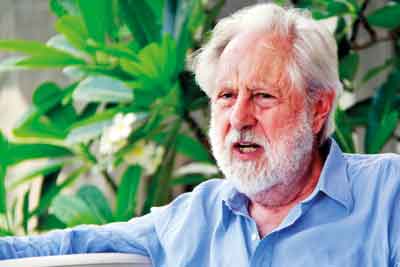Make climate change your cause, Lord Puttnam tells younger generation

David Puttnam: An undiminished love for learning. Pic by Indika Handuwala
With 10 Oscars, 25 BAFTAs and the Palme d’Or at Cannes among his innumerable accolades (and these are only for film) Lord David Puttnam can cut an intimidating figure in one’s imagination. Then one could add classic films such as ‘Chariots of Fire’, ‘Local Hero’, ‘The Killing Fields’ and ‘Bugsy Malone’ to his resume in addition to the 45 honorary degrees he holds from universities around the world and the work he has championed in areas of climate change, education and policy development. But when we meet the 76-year-old film maker, he waves to us with a floppy hat, his easy conversation much like his lectures and presentations – simple, practical and heartfelt, putting us at ease. “The good thing about being old,” he divulges, are the years spent travelling, meeting people and doing what he loves best- learning.
At the Fairway Galle Literary Festival for the first time, Lord Puttnam’s focus was on the immediacy of the environmental challenges and corresponding political and economic interests that affect today and tomorrow’s future generations. He gave a similar talk last year in June and GLF founder Geoffrey Dobbs who was in the audience invited him to do the same at the festival this year. “The dates worked out very well, so here I am,” he smiles.
In addition to his advocacy for climate change, the former President of UNICEF UK, ‘digital champion’ of Ireland and Labour peer has also worked tirelessly toward the advancement of education in the UK. His long standing love for learning however had a rather tumultuous beginning. “It’s based on revenge,” he twinkles, when asked about his involvement in education following his retirement from the film industry in 1998.
Educated at Minchenden Grammar School in London, he studied only until his O-level examination. “My own experience with education was miserable,” he says but discovered a hidden passion for learning only after enrolling himself at night school which found him studying nine subjects over the course of three years. He created his own curriculum consisting of a series of subjects “that I felt all made sense- were inter-related.” These included a course on typography, copywriting; which would help him in the near future in a career in advertising, basic business administration to economics. “I liked learning. In school I was told the opposite.” “Of course, I never bothered to turn up for exams,” he adds candidly; the need for self-honesty continuously finding its way back to him over the course of our conversation.
Despite being far from the perfect student, the young David was a voracious reader and lover of Dickens. His favourite- A Tale of Two Cities. “I was always interested in the subject of sacrifice,” he shares, perhaps reflecting on the conflicted Sydney Carton’s ultimate gift to Lucie, Darnay and their family. “It’s a theme that has turned up in my movies many times- of men, sacrificing themselves for men.”
His passion for learning, for bringing diverse subjects together from his night school curriculum to his work as a film producer and later in education and environment started at a young age. His mother was a homemaker and his father, Leonard Arthur Puttnam, a celebrated photojournalist who clearly left an impression on his young son. “He had a good reputation and a very interesting life,” he says, recalling his father’s subjects from Churchill to being the King’s photographer at a certain point. Accompanying his father to Fleet Street on Saturdays is still a vivid memory and he lights up as he remembers discussing layout ideas for pictures with his father at home and helping him around the office. “I always imagined I’d work there.”
But Leonard imagined differently, hoping his son would pursue a career in advertising-a line of work he took to easily, having acquired a practical, critical understanding of the subject from his father. It would later open a series of doors for the acclaimed film-maker. But for him- “It was a lonely profession,” until he joined his third agency which he calls “my university”- a fairly new agency which escalated his prospects.
His desire to work in education wasn’t always at the back of his mind. “Some people leave school. I fled,” he laughs. But he taught, whenever he could, because in his own words “teaching is a very good way of learning.” Following his retirement, he was given two choices on the very same day- to join the House of Lords and a call from the Secretary of Education. He chose the latter. “I didn’t know what I was getting into.” His first task in education was almost fate- to look into teacher morale, improvement and attention given to teachers. “We were going through a very bad period with teachers.” Coming from a commercial world, the staffrooms and schoolrooms he was supposed to visit and report on had him appalled. The demoralization, lack of facilities and bureaucratic feel that pervaded the public education system got him thinking. “They never saw themselves as units but as miserable individuals” in addition to education which itself was underfunded.
In 1998 he founded the National Teaching Awards which he chaired till 2008. “It was like the Oscars for teachers”, a boost for the profession as a whole. “It wasn’t a brilliant idea,” he shrugs self-effacingly, a mannerism that clings to the soft spoken advocate. “You don’t have to be a genius to think that celebrating teachers was a good idea.” Next year, marks the 20th anniversary of the awards. He also served as the first Chair of the General Teaching Council from 2000 to 2002, was chairman for 10 years at the National Film and Television School, first Chancellor of the University of Sunderland, chairman of Atticus Education, an online education company and many more. “Again, I learnt a lot,” he smiles quizzically recounting his days as part of the Teaching Council.
What he also cultivated was a growing appreciation and affection for teachers- “especially primary school teachers.” “I also came to realize that any society is only going to develop alongside its education.”His logic is simple- “A successful society without a successful system of education is a ridiculous fantasy.”
During his tenure as president of UNICEF UK from 2002-2009, his understanding of global education was widened. “If you have one dollar to spend, spend it on educating women,” he explains, pointing out that the most successful countries are countries where gender is a non-issue.
Alongside education, his advocacy for climate change is what he will share with Lankan audiences. One who goes straight to the heart of the issue, “the problem is that humans beings suffer from what we call the boiled frog syndrome.” Like an oblivious amphibian floating in water that is slowly but surely bubbling away, “We are good at crisis management, but terrible with slow burn issues.”
In 2007, he chaired the Joint Parliamentary Committee on the Draft Climate Change Bill from which emerged the world’s first Climate Change Act that created a lasting impression on him. But it was a simple request, made to him while he was still in the film industry that sparked his passion for climate change.
In 1983, Puttnam’s Scottish dramedy “Local Hero” was released. The story of an American oil company representative who is sent to a fictional village in Scotland to purchase the town and surrounding property for his company, it was his first film to highlight the environment as its theme. “I remember a guy came to meet me, from the Council for the Protection of Rural England,” he recalls, confused when he was asked to be its president. “I had never even heard about it,” he admits. What confused him even more- “was that I was a Londoner.” What the ‘fellow’ said next would leave a lasting impression- “unless people in cities understand how important it is to have countryside, we will lose it altogether.”
He became its Vice President and has since been on the path to reach and enlighten others. His devotion to the preservation of the environment even found him coming back to his dramatic roots. In 2015, he began work overseeing the production of “Arctic 30” an environmental drama based on the true story of the group of Greenpeace activists who, in September 2013 scaled a Russian oil platform in an attempt to ‘save the Arctic’.
 When he thinks of millennials, he sees opportunity. While working with the Department of Education he consciously had them and their future generations in mind when working with teachers alongside Sir Ken Robinson. “By 2002 we knew that tech and social media would play an important role.” Looking at professions that the current generation and the next would pursue, “we knew they would be different jobs from what we know. Probably 60% of jobs we won’t have ever heard of.” Education then has to teach skills and create a generation of flexible multi-disciplined individuals. In fact, he may have been a millennial long before their time. Laughing, he recalled his parents’ horror when he left his first job, his second job- a few years later and then proceeded to enact the extent of their shock when ten years later he switched careers and entered the film industry. “I can’t remember a time when I wasn’t doing five to six things simultaneously.”
When he thinks of millennials, he sees opportunity. While working with the Department of Education he consciously had them and their future generations in mind when working with teachers alongside Sir Ken Robinson. “By 2002 we knew that tech and social media would play an important role.” Looking at professions that the current generation and the next would pursue, “we knew they would be different jobs from what we know. Probably 60% of jobs we won’t have ever heard of.” Education then has to teach skills and create a generation of flexible multi-disciplined individuals. In fact, he may have been a millennial long before their time. Laughing, he recalled his parents’ horror when he left his first job, his second job- a few years later and then proceeded to enact the extent of their shock when ten years later he switched careers and entered the film industry. “I can’t remember a time when I wasn’t doing five to six things simultaneously.”
As we wish him good luck for his presentation on Saturday, he shrugs, chuckling whether people would come at all. Much like his work in the movies, his ability to link technology, education, climate change and bring forth ideas and conversation that is universally appealing is why he is easily a legendary producer- despite claiming not to have a single creative bone in his body.
As he leaves us with his signature benign smile, armed with his floppy hat and printouts of Saturday’s slideshow, he looks like a man on a mission. He has one last morsel of inspiration for the young people he has worked tirelessly for- “the civil rights movement was our cause. Climate change should be yours.”


